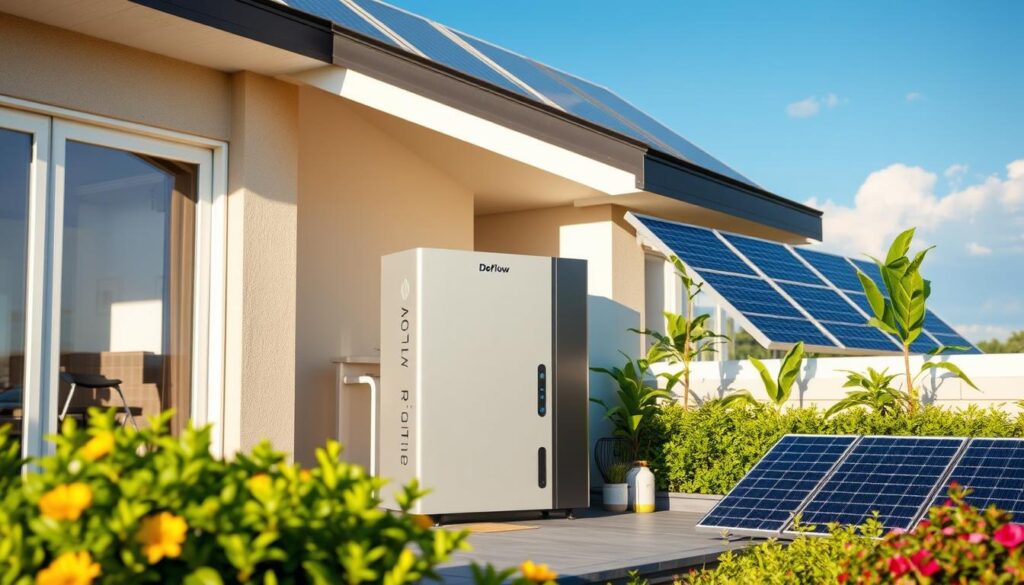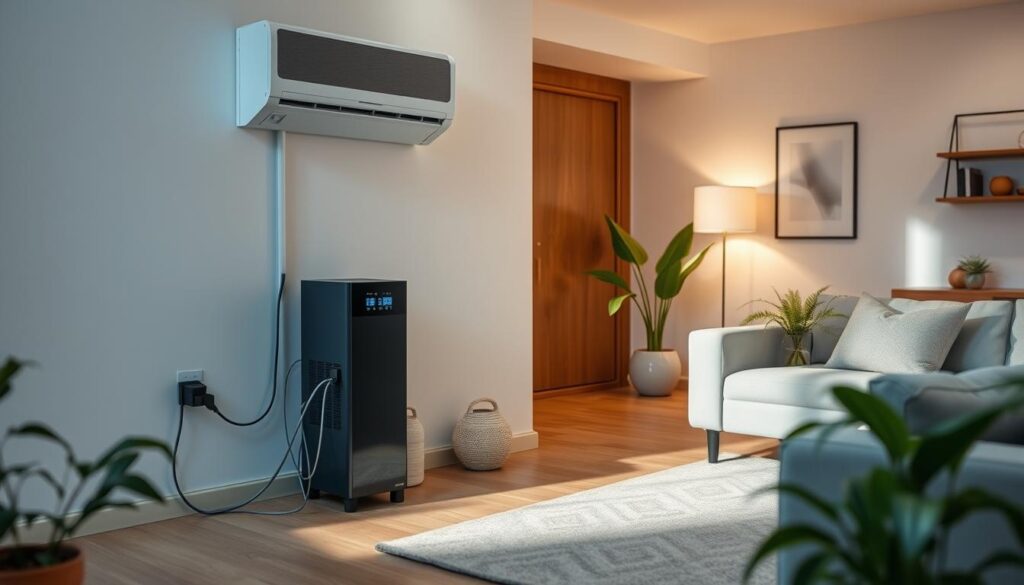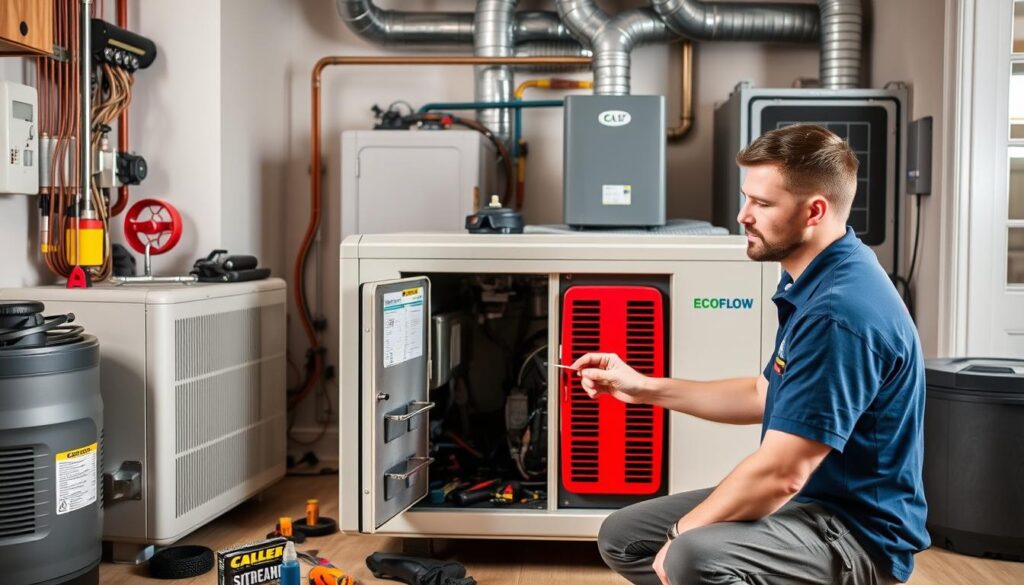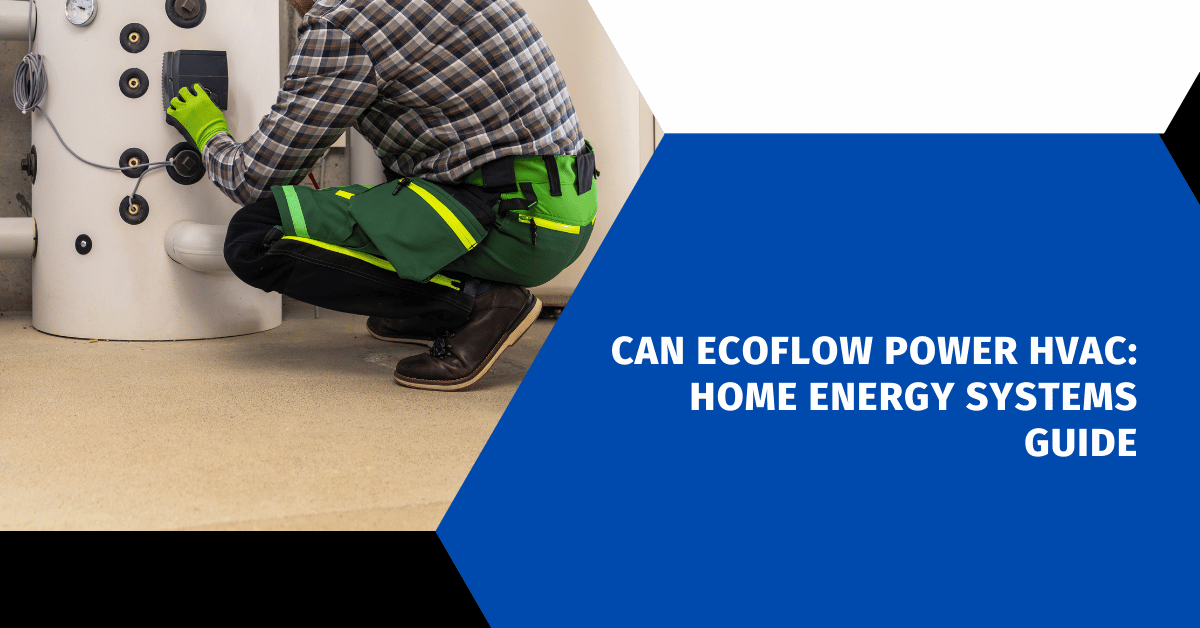Can EcoFlow Power HVAC? In today’s world, having reliable and strong home energy solutions is key. You might wonder if EcoFlow can power your HVAC system and manage your home’s energy. The EcoFlow DELTA Pro Ultra offers a new way to power your whole home, including your HVAC.

Key Takeaways
- The EcoFlow DELTA Pro Ultra can run all your home appliances for up to a month without power. Or, it can go on forever with enough solar panels.
- Its design lets you add more batteries and power as your home needs it.
- Adding EcoFlow solar panels can cut your electricity bills to zero by making clean energy.
- The DELTA Pro Ultra fits many HVAC systems with its flexible power options.
- EcoFlow’s tech can make your home much greener and cut down on carbon emissions.
Table of Contents
Understanding EcoFlow Power Systems for Home Use
EcoFlow power systems offer reliable and versatile power solutions for your home. They consist of key components that ensure uninterrupted electricity during outages or off-grid living. Let’s explore the core elements and capabilities of these innovative home backup batteries.
Core Components of EcoFlow Systems
At the heart of EcoFlow’s power solutions are advanced LiFePO4 (Lithium Iron Phosphate) batteries. These batteries are safer, last longer, and perform better than traditional alternatives. The EcoFlow DELTA Pro Ultra, for example, has a battery capacity of up to 3,600 watt-hours (Wh). This ensures extended power security during blackouts or off-grid scenarios.
Power Output Capabilities
The EcoFlow DELTA Pro Ultra can output 3,600 watts continuously and 7,200 watts at peak. It can power a wide range of household appliances at once. This includes small, medium, and large air conditioning systems, and even central air conditioning systems.
System Integration Options
EcoFlow’s power stations integrate with your home’s electrical system through smart home panels or manual switches. This allows for a smooth switch to EcoFlow during outages. The DELTA Pro Ultra also supports up to 42 units of EcoFlow’s 400W solar panels. This lets you use renewable energy for sustainable off-grid living or to supplement your home’s power needs.
“The EcoFlow DELTA Pro Ultra is a game-changer for home backup power, offering reliable and versatile electricity when you need it most.”
Understanding EcoFlow’s power systems helps you choose the right solution for your home. Whether for emergency preparedness, off-grid living, or sustainable energy management, EcoFlow has you covered.
Explore Our HVAC Shop
Looking for top-rated HVAC tools, parts, and accessories? Visit our shop and find the perfect solution for your needs.
Visit the ShopCan EcoFlow Power HVAC: Capacity and Performance Analysis
The EcoFlow DELTA Pro Ultra is a powerhouse for your home’s HVAC system. It can output up to 7.2kW, enough for most home air conditioners.
Air conditioners use between 500 to 4,000 watts, depending on size and efficiency. The EcoFlow DELTA Pro Ultra’s 7.2kW output can be expanded to 21.6kW. This means it can power even the biggest 3-ton central air systems. Your home will stay cool and comfy, even without power.
| Air Conditioner Size | Power Consumption (Watts) | EcoFlow DELTA Pro Ultra Compatibility |
|---|---|---|
| Small Window Unit | 500 – 1,000 | ✓ |
| Medium Window Unit | 1,000 – 2,000 | ✓ |
| Large Window Unit | 2,000 – 3,000 | ✓ |
| Central Air Conditioner (3-ton) | 3,000 – 4,000 | ✓ |
Matching the EcoFlow system’s power to your HVAC’s needs ensures reliable performance. This combo of portable power and climate control offers peace of mind and comfort when you need it most.
Explore Our HVAC Shop
Looking for top-rated HVAC tools, parts, and accessories? Visit our shop and find the perfect solution for your needs.
Visit the ShopEcoFlow DELTA Pro Ultra Specifications
The EcoFlow DELTA Pro Ultra is a top-notch portable power station. It’s great for keeping your home powered during outages or off-grid trips. Let’s look at what makes it a top choice.
Battery Storage Capacity
The DELTA Pro Ultra has a big battery at its core. The basic model has a 6kWh LiFePO4 battery. But, you can boost it up to 90kWh. This means a typical home can have over 30 days of backup power.
Charging Options and Speed
The DELTA Pro Ultra has many ways to charge its battery. You can charge it from the grid, solar charging (up to 5.6kW input), EV charging, or a generator. Its MultiCharge technology lets you charge two batteries in just 2 hours at 8800W.
Power Output Ratings
The DELTA Pro Ultra has a lot of power. The basic model gives 7.2kW of continuous power and 10.8kW for surges. Adding two more inverters boosts the total output to 21.6kW. This is enough to run big appliances, like a 3-ton central air conditioner.
The EcoFlow DELTA Pro Ultra is a solid choice for reliable home backup power. It’s perfect for getting ready for outages or for off-grid adventures. This power station keeps your important devices and appliances working well.
Smart Home Integration and Control Features
The EcoFlow systems work well with your smart home through the EcoFlow Smart Home Panel 2. This panel lets you control up to 12 circuits. This means you can manage power and prioritize what’s most important when energy is scarce.
The EcoFlow app is great for checking and managing your home’s energy use from anywhere. It has features like Storm Guard, which gets your system ready for bad weather. It also has Circuit Control, making sure important appliances get power when it’s out.
The EcoFlow Smart Home Panel 2 also has a Time-of-Use (ToU) Mode. It helps save energy by charging and using power wisely. The Self-Power Mode lets your solar panels fill up your battery when it’s full.
The EcoFlow app and PowerInsight dashboard give you live updates on your energy use and solar power. This helps you make smart choices about your energy and save more.
With EcoFlow, your home stays powered and your needs met, even when the power goes out.
“The EcoFlow Smart Home Panel 2 and app have been game-changers for our home’s energy management. The level of control and visibility they provide has allowed us to optimize our usage and reduce our energy costs significantly.”
– Sarah, Homeowner in Los Angeles
Explore Our HVAC Shop
Looking for top-rated HVAC tools, parts, and accessories? Visit our shop and find the perfect solution for your needs.
Visit the ShopSolar Panel Integration and Renewable Energy Options
EcoFlow’s power systems work well with solar panels. This lets you use the sun’s energy. You can connect up to 42 EcoFlow 400W solar panels. This can give you up to 16.8kW of power, enough to power your home for a day with just one hour of sunlight.
Solar Panel Compatibility
EcoFlow has solar panels that fit well with their power stations and batteries. These panels are very efficient, converting up to 23% of sunlight into energy. This means your system will charge fast and work well.
Energy Generation Potential
Using EcoFlow’s solar panels and energy storage, you can live off the grid. Or, you can make a hybrid system that uses less from the grid. This lets you customize your energy system for your needs, whether it’s for a cabin, RV, or home.
Using EcoFlow’s solar integration gives you a clean and reliable energy source. It also helps the planet by reducing carbon emissions. With EcoFlow, you can live off the grid or add solar power to your home.
Running HVAC Systems with EcoFlow Power Stations
Using an EcoFlow power station to run your home’s HVAC system is smart and efficient. HVAC systems need to consider both running and startup wattage. This can change a lot based on the system’s BTU rating.
A 5,000 BTU air conditioner usually needs about 1,465 watts. But a 20,000 BTU system might need up to 5,860 watts.
The EcoFlow DELTA Pro Ultra has a strong 7.2 kW output. It can power most home air conditioning units, including 3-ton central systems. For bigger HVAC setups, you can link multiple EcoFlow inverters. This lets you run even the biggest energy users.
| HVAC System BTU Rating | Approximate Startup Wattage | EcoFlow Power Station Compatibility |
|---|---|---|
| 5,000 BTU | 1,465 watts | EcoFlow DELTA Pro Ultra |
| 10,000 BTU | 2,930 watts | EcoFlow DELTA Pro Ultra |
| 15,000 BTU | 4,395 watts | Multiple EcoFlow Inverters |
| 20,000 BTU | 5,860 watts | Multiple EcoFlow Inverters |
EcoFlow’s advanced technology lets you run your HVAC system with ease. Whether it’s a window unit, portable AC, or a full home system. With the right EcoFlow power station, you get reliable, eco-friendly climate control. Even when there’s no power or in off-grid areas.

Explore Our HVAC Shop
Looking for top-rated HVAC tools, parts, and accessories? Visit our shop and find the perfect solution for your needs.
Visit the ShopCost Analysis and Return on Investment
Thinking about getting an EcoFlow power system for your home? It’s key to look at the costs upfront and the savings later. The price changes based on what you pick, but a basic setup costs about $9,795. This includes one DELTA Pro Ultra and four 400W solar panels.
For bigger setups with more batteries and solar panels, prices can go up to $23,590 or more. But, the savings over time can be big. You might cut down on your energy bills a lot. This means you could save a lot on your energy bill reduction and solar power savings.
Also, using stored energy when electricity is cheaper can save you even more. EcoFlow systems are flexible and can grow with your needs. This makes them a smart and affordable choice.
Initial Setup Costs
The cost to start up with an EcoFlow system varies. A basic setup with a DELTA Pro Ultra and four 400W solar panels costs about $9,795. Larger systems with more batteries and solar can cost up to $23,590 or more.
Long-term Savings Potential
The savings from an EcoFlow system last a long time. By using less grid power and maybe no power bills, you save a lot. This leads to big energy bill reduction and solar power savings over time. Plus, using stored energy when it’s cheaper saves even more.
Industry data shows that solar systems can pay back in 8 to 10 years. The average return on investment (ROI) is about 10%. EcoFlow systems are flexible and can grow with your needs. This makes them a smart and affordable choice.
“The initial investment in an EcoFlow power system may be higher, but the long-term savings and energy independence make it a worthwhile investment for many homeowners.”
Installation and Maintenance Requirements
Setting up EcoFlow power systems in your home can be easy or complex, depending on the setup. Simple portable power stations, like the EcoFlow DELTA Pro, are often DIY-friendly. But, for complex whole-home setups with the EcoFlow Smart Home Panel 2, it’s best to get a pro to install it right and safely.
EcoFlow’s power systems are designed to be easy to care for. They use LiFePO4 batteries that don’t need regular checks or maintenance like old batteries do. This means you get reliable backup power without the worry of frequent battery swaps or upkeep.
Still, some parts of your EcoFlow system might need occasional care to work their best. For example, solar panels might need cleaning to keep them efficient at making energy. This helps them keep up their energy-generating game.
| Installation Complexity | Maintenance Requirements |
|---|---|
|
|
Knowing what’s needed for installation and upkeep of your EcoFlow system helps. It ensures your system works well, whether you’re doing it yourself or hiring a pro for a bigger job.

Conclusion: Making the Switch to EcoFlow Power Systems
EcoFlow’s power systems are a smart choice for your home’s energy needs. They can even power your HVAC systems. These systems give you energy independence and a reliable backup power source.
They protect your home from unexpected power outages and help reduce your carbon footprint. EcoFlow’s products come in different sizes and power levels. This means they can fit any household’s needs.
Choosing EcoFlow means moving away from old, polluting generators. It’s a step towards a greener home. If you want to make your home more energy independent, EcoFlow is a great option.
It’s also a good choice if you’re looking into renewable energy. EcoFlow’s systems are easy to use and reliable. Make the switch to EcoFlow for a better, more sustainable future for your home’s energy.

